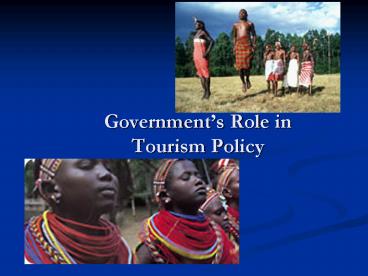Governments Role in Tourism Policy - PowerPoint PPT Presentation
1 / 20
Title:
Governments Role in Tourism Policy
Description:
To understand the roles of NTO's and how they differ ... Lockerbie airline crash site. Mt. St. Helens and Pompei. Princess Diana's home and death site ... – PowerPoint PPT presentation
Number of Views:75
Avg rating:3.0/5.0
Title: Governments Role in Tourism Policy
1
Governments Role in Tourism Policy
2
Objectives
- To understand the different forms of National
Tourism Offices (NTOs) - To understand the roles of NTOs and how they
differ - To understand how an NTO should respond to
disasters and crises in tourism. - To understand the various kinds of certification
in tourism
3
Types of National Touirsm Organizations (NTOs)
- State tourism secretariats (Ministries)
- Government agencies within other departments
- Quasipublic agencies
- Private industry
- Also there are regional, state and city tourism
offices.
4
Typical Roles of NTOs
- Liaise with other government agencies
- Destination Information Provision destination
management systems (DMS) - Marketing and Promotion
- Collection of tourism statistics and data
- Visitor arrival, expenditures, behavior,
satisfaction - Tourism product certification and grading
- Tourism product development
- Education and Training
- Tourism Policy development
- Crisis Management
5
Lets Look at a Couple of Examples
- Hong Kong
- Australia
6
Disaster and Crisis Management in Tourism
- In todays world this is an important function
for NTOs.
7
Tourism Crisis and Disaster Management
- Natural disasters e.g. hurricanes, earthquakes,
volcanic eruptions, floods, foot-and-mouth
disease - Crimes and violence
- Political instability riots, regional tensions
- War and civil unrest
- Terrorism
- an unsigned message of violence without content
sent to a person of unknown address - Salab Wahab.
8
Characteristics of a Disaster
Short-term focus
surprise
panic
insufficient information
Loss of control
escalating flow of events
9
TYPOLOGY OF TOURISM CRISES
High degree of control
Labor shortages
Hotel overbooking
Reduction in flights
Water pollution
Crime wave
Public workers strike
Epidemic
Sudden
Gradual
Airline strike
Chemical spills
Terrorism
Political problems
Fires hurricanes earthquakes
Currency fluctuations
Bad weather
Low degree of control
10
Tourism and Terrorist Attacks
- Visibility of tourism
- Symbolic
- Foreign-looking camouflage
- Economic weakening of the host
- News value
11
Steps to Manage a Destination Crisis
- Identify severity of event its effect on
tourism - Establish Crisis Management Team
- Assist tourists in the destination
- Assist the industry in recovering
- Promote destination during and after the crisis
- Monitor recovery and analyse the crisis experience
12
A few destinations experience with disasters
- China 1989 Tianamen Square Incident hotels
dropped to 15 occupancies - Luxor, Egypt 1992-3 lost 1 bn in tourist
revenues due to terrorism - Florida USA 1993 Crimes caused 20 decrease in
arrivals - Gulf War 1990-1 travel to region decreased
significantly - 9/11 attacks in the USA travel initially stopped
completely and was slow to recover. Global
decrease of 1.7 GDP 8mn jobs lost. - 2002 Bali bombings hotel occupancies less than
15
13
DARK TOURISMDisaster Sites as Attractions
- War sites and memorials
- Lockerbie airline crash site
- Mt. St. Helens and Pompei
- Princess Dianas home and death site
- US Holocaust Memorial Museum
- World Trade Center site
14
Certification inTourism
15
Certification inTourism
- Health, Hygiene, Safety
- Why Certify?
- To promote implementation of standards
- To reward those institutions who perform well
- To inform customers
- To ensure consumer satisfaction
Quality
Sustainability
16
CONFORMITY ASSESSMENT
Acceptance
Recognition
Accreditation
Certification
Assessment
Standards
17
Who Certifies?
- Professional associations e.g. Chamber of
Commerce WKO - Governments e.g. Dept of Health and Safety
National Tourism Organizations - International Bodies Forest Stewarship Council
Fair Trade
18
Tourism Hospitality Certification
- Voluntary or Mandatory (government measures to
support voluntary standards) - Levels
- Single company
- Multi-company
- e.g. Tour Operators Initiative for Sustainable
Tourism - National Certification
- Supra-National Certification
- Hotel rating systems - Diamond
- Blue Flag Campaign
- Green Globe 21 Certification
- International Guidelines/Codes of conduct
- e.g. WTO Code of Ethics
19
Green Globe 21
- GG 21 is a world-wide benchmarking and
certification program which faciliates
sustainable tourism and travel for consumers,
companies and communities. It is based on Agenda
21 and the principles for sustainable development
from the Rio Summit. - Four Standards
- Company
- Community
- Eco-Tourism
- Design and Construction
20
Blue Flag Campaign(Run by Foundation for
Environmental Education)
- Water quality
- Environmental education
- Information
- Environmental management
- Safety































